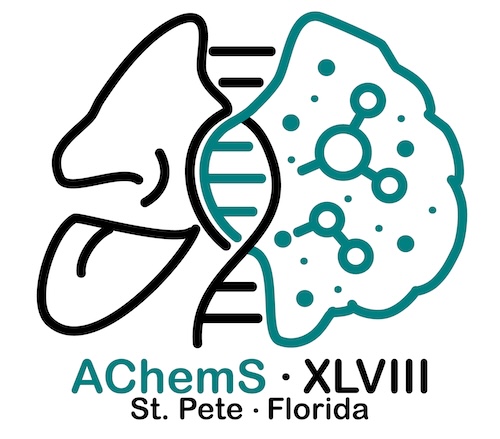AChems Press Release

Association for Chemoreception Sciences (AChemS) 41ST Annual Meeting:
Smell and Taste: Our Link to the Environment
Media Contact:
Dr. Thomas Mast, Chair, Public Information and Affairs Committee; email: [email protected]. Before 14 April and after 17 April: Phone 734.487.6916; April 14–17, 2019, Hyatt Regency Coconut Point Resort and Spa, Bonita Springs, FL; Phone 1.239.444.1234 and 850.212.7072 (cell).
Bonita Springs, FL— Smell and taste are vital senses that bring pleasure to daily life, guide fundamental behaviors in humans and animals, and link us to the environment. This month, about 500 scientists and clinicians will gather for the nation’s leading forum on smell and taste research, the annual meeting of the Association for Chemoreception Sciences (AChemS). AChemS will feature over 260 presentations on the roles of smell and taste in both human health and animal behavior. Smell and taste are crucial to daily functions ranging from food choice to selecting commercial products to detecting environmental dangers. AChemS researchers seek to understand chemosensory systems and function in order to improve the diagnoses and treatment of multiple maladies. This year new findings will be presented on a range of topics from the mechanisms of carbon dioxide detection in nematodes, to salt detection in mice, and to correcting the loss of smell in humans with an olfactory implant. The 41st annual AChemS meeting is the premiere opportunity to learn about the newest findings in the biological, psychological, and clinical aspects of smell and taste.
Members of AChemS (https://www.achems.org) will present the latest research on taste, smell and related issues (see program at https://achems.org/2019/program.php). The four-day meeting includes scientists from all around the world, and will feature: ten symposia (including clinical and industry symposia), five poster sessions, three oral sessions, a plenary lecture, a workshop on measuring human olfaction, and a journal club.
Press Abstracts
Selected new discoveries to be presented at the meeting include (embargoed until April 14th):
- How to bug a spider
https://achems.org/web/resources-press-2019-1.php; contact: Cecil J. Saunders, [email protected]; +1 828-443-3652). - How parasitic worms hunt down and infect hosts
https://achems.org/web/resources-press-2019-2.php contact: Elissa A. Hallem, [email protected]; +1 310-825-1778). - Restoring the sense of smell
http://achems.org/web/resources-press-2019-3.php; contact: Daniel H. Coelho, [email protected]; +1 804-828-2785). - Smell tests may predict anxiety and depression after a concussion
http://achems.org/web/resources-press-2019-4.php; contact: Johannes Frasnelli, [email protected]; +1 819 376 5011). - A novel salty taste receptor in mice
http://achems.org/web/resources-press-2019-5.php; contact: Takami Maekawa; +81-44-210-5854 (ext: 7196). - Children’s preference and ability to detect sugars differ from adults
http://achems.org/web/resources-press-2019-6.php; contact: M. Yanina Pepino, [email protected]; +1 267 432 1068 OR Julie Mennella, [email protected]; +1 267 978 1695). - Undetected olfactory loss has no major impact on your functioning
http://achems.org/web/resources-press-2019-7.php; contact: Anna Oleszkiewicz, [email protected]; +48 502 054 092). - Roses make life sweeter, but only in the lab
http://achems.org/web/resources-press-2019-8.php; contact: Susan E. Fahrbach, [email protected]; +1 336 829 8008).



